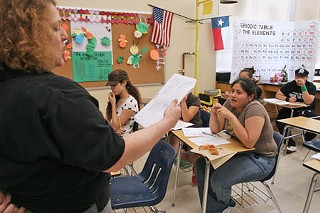The TAKS Is Dead! Long Live the TAKS!
Students continue to cram for slow-to-expire high-stakes tests
By Michael May, Fri., June 29, 2007

On Monday, June 11, dozens of kids trudged into Travis High School to begin a 21/2-week crash course in passing the exit-level Texas Assessment of Knowledge and Skills, which students must pass in order to graduate from high school. In Austin, 11% of all seniors – 419 students – had previously failed the test, despite the fact they were given five chances to pass it. At Austin, Reagan, and Travis high schools, almost a quarter of the seniors failed.
Just about everybody – including the Texas Legislature, which officially killed the exit-level TAKS in May – thinks the high-stakes testing system is bad for the kids. But TAKS is dying a very slow death. The new battery of end-of-course exams won't be implemented until 2011 and initially just for the freshman class. So, for students graduating before 2014, the Legislature's action offers vindication – but no relief. If you've finished the sixth grade, you're doomed to take TAKS for the rest of your school career.
The subject that poses the greatest difficulty for seniors is science – including biology, physics, chemistry, and ecology – and that leaves review teachers Alice Roberts and Katie Woodberry with a few weeks to teach a packed Travis High classroom of students how to pass a test that covers four years of curriculum. Woodberry, a loud, boisterous teacher with a sarcastic sense of humor, creates the sense that the test is a game that they can beat together. "Look carefully at the answers," she told the class on the first day. "Sometimes there will be a keyword in the question that's repeated in the answer. That's often correct. One question asked, 'The bean plant is in what kingdom?' And the answer was 'Plantae.' Do you know how many kids got that wrong because of that added 'a' and 'e'? ... Duh duh duh duhhhhh." She sang that last part to the tune of Beethoven's Fifth.
Woodberry hopes to make students feel that they can beat the test with a mixture of confidence, cunning, and calm. After class, she gave 17-year-old Cameron Carter a pep talk. "We are going to give you the attitude, not just the skills, to be successful on this test," she told Carter. "Because you're not going to let this test get you down. This is just stupid politics."
"Politics?" Carter asked. "So, what happens when they replace this test with end-of-course exams?"
"They'll probably replace it with something just as idiotic," said Woodberry with a grin.
Testing to the Test
The ostensible purpose of the exit-level exams is to make sure students graduate from high school with a basic understanding of the subjects they've taken. So, beginning when they are high school juniors, students take a test in each of the four "core" subjects (English, science, social studies, and math), and they are given five chances to pass before graduating high school. If they fail to pass before the rest of their class graduates, they can continue to take the test as many times as they wish.
At first, the tests didn't provide much of a hurdle. In 2004, 96% of students passed the test. But each year students are expected to answer more questions correctly, and the number of students passing it has steadily dropped. By spring of 2006, 16% of seniors failed the test – and 13% failed the science portion. Louis Malfaro, president of the teachers' union Education Austin, reacts to the numbers like many parents. "You have one out of seven students doing everything but passing the test," he says. "They stick to the rules. They finish school. They don't drop out. And then they're denied a diploma. What do you do without a high school diploma? Just check out?"
As more and more students failed the test, lawmakers began to pay attention to what students and teachers have been saying for years – that the test's comprehensive nature is a fatal flaw. For example, a significant portion of the exit-level science TAKS focuses on biology, a subject that's taught to freshmen. So teachers often put their classes on hold to review old material with seniors – the practice known as "teaching to the test." The Washington, D.C.-based Center on Education Policy studied the effect that the exit-level TAKS had on instruction in Austin and compared it to the system in Jackson, Miss., which offered end-of-course exams. "In Austin, teachers were saying that the exit exam was a distraction from ordinary school," says CEP President Jack Jennings. "They had to put aside what they were teaching in order to study for the test. In Jackson, teachers felt that the tests were a logical extension of the course they were teaching. It seemed to make more sense."
The new exams will still be standardized tests created by the state and are unlikely to solve some of the other complaints about the TAKS test. Science teacher Alice Roberts has been teaching in Austin for more than 20 years, and she says mandatory standardized testing has changed fundamentally how classes are taught. "We used to be more exploratory," she explains. "It was more about thinking skills. There's a lot of cool things you can do in chemistry, but if it's not on the test, you don't teach it. Now it's become teaching to the test. It really has."
Not everyone considers it a bad thing that teachers have much less freedom than in earlier years. Parents now move their children from school to school much more often, and this is especially true among poor families in urban areas like Austin. A standardized curriculum provides some stability for these students. The new system approved by the Legislature is unlikely to change that. In fact, it might force high school teachers to stick even more tightly to the curriculum. It will replace TAKS' four broad exit exams with 12 end-of-course exams – three in each core subject area. The scores on the exams will count as 15% of a student's grade in the class, and in order to graduate, students will have to score an average of 70 points in each subject area and at least 60 on each test. (This does not necessarily mean a student must get 60% on the test. The test's designers will determine how many questions a student must answer correctly to reach 60 points.)
Testing advocates like Sandy Kress, an Austin lawyer who was a senior adviser to President Bush on the No Child Left Behind law, think the changes are a good thing. "The new system is better because students will be tested fresh after learning the material," he says. "And they will be tested more deeply on the stuff they've taken. But, as this gets implemented, some of the people who wanted to get rid of the exit-level TAKS may find that the old system was easier to deal with."
It may seem obvious to the legions of testing advocates and their allies at the Legislature that graduating high school students should "know" the subjects they've studied. But were those same testing enthusiasts themselves required to pass such tests, most would first have to spend weeks reviewing the specific material to be tested – perhaps in a cram camp just like this one.
Fixing What's Broken
On the second day of the TAKS camp (the official Austin Independent School District title is the Summer TAKS Power Workshop), teacher Alice Roberts reads through a practice test, question by question, to get a sense of what students need to work on. One of the questions requires students to create a graph based on how different soaps kill bacteria in a petri dish. She asks the class, "Anyone know what agar is?"
Silence.
"Agar is a material with nutrition that bacteria like to eat," says Roberts. "You put it in a petri dish, and then you can start looking at the number of bacteria colonies. We know what bacteria are. What's a colony?"
Silence. Roberts lets it hang in the air for seconds.
"How are you going to answer the question if you don't know the terminology?" she says, a note of irritation creeping into her voice. "You have to let me know when you don't understand something. Now, think back to your history. The original 13 colonies. People settled in this country, and the population started growing. The same thing happens when bacteria fall on a petri dish. They use asexual reproduction and just start dividing."
When it comes to science, it seems that many students have a mental block. Typical is 18-year-old Laura Constante. She passed every other portion of the test on her first try, but still struggles with science. She's now taken the test six times. The last time she failed by one question. "It's embarrassing," she says. "I really do care. It's the vocabulary that keeps me from passing. There are some words in science that I really don't understand. I haven't taken biology since freshman year, and a lot of that has gone away."
Constante doesn't get a lot of help at home either. "My parents try to help, and it means a lot to me that they try," she says. "But they don't speak English, and they haven't been to school in a long time. My mom didn't even graduate high school. And it's hard for me to find time to study at home. I have to take care of my sister's kids, and my mom's been sick, so I have to do the housework, as well."
Constante also suffers from another common TAKS camper problem – test-taking anxiety. "I get really nervous," she says. "And when I get nervous, my brain just blanks out. I sit there and just space out, trying to remember what I've learned. It gets to the point where I just want to give up. I know I really want this. I want to move on."
These challenges are so pervasive that Woodberry and Roberts spend the majority of their class time on helping kids with vocabulary and test-taking skills and hope it's enough to help them over the hump. "A lot of these kids, especially the English language learners, can pass the test if they understand the question," Woodberry says. "But their vocabulary is very weak. A lot of these students didn't grow up reading books. Even the cartoons they watched as children have been dumbed down since the Seventies. They don't know words like 'phenomenon,' 'increase,' 'tends.' That's what we're up against – generations of dumbed-down Americans. But they're writing the TAKS test as if nothing had changed."
Woodberry says many kids are hobbled by anxiety. She saw one student get hysterical and have to spend an hour sobbing in the nurse's office. So she spends a good deal of time coaching on test-taking skills. She tells the students to get a good night's sleep before the test and to eat a healthy breakfast. And she's constantly reminding students to relax. "So many kids sit in front of the test and just go – whoosh!" she tells the class, her hand waving in front a blank expression. "You find yourself in your reptilian brain. Your breathing is accelerated. Your mouth is dry. You're not able to think. Remember to take a breath and calm down before the adrenaline starts flowing. You can do that test. It's not that big a deal."
Many of these students have taken the test several times and improved each time, but since the state raises the bar every year, it's possible to improve and still lag behind. Eighteen-year-old Luis Perez failed the test by three questions the first time he took it, and the last time he failed by two questions. This spring he watched his friends graduate without him. "It keeps getting harder every year," he said. "It makes me mad and disappointed. I didn't get to walk the stage. I feel like I've worked hard for nothing."
Perez is going to keep working on it because he has plans to study mechanics, and he needs the degree. But he has friends who just gave up. "A lot of people I know are dropping out," he says, "just because of the test."
Some students acknowledge that they're struggling because of choices they made. Sarah Faison enrolled in an experimental charter school called the Eagle Academy, where students largely used computers and packets to teach themselves. "It appealed to me because I'm shy," she said. "And I didn't want to go to a big public high school. The Eagle Academy only had 200 students, and it was more laid-back." Faison managed to get through the packets and earn credits, but her mind wasn't focused on school. "My mom's a single parent," she says. "And I always had to work to pay for my own things. So I was always tired at school. And being a teenager was hard for me; I just wasn't focused."
Faison realizes now that she would have done better in a traditional classroom with a teacher, but it's too late to go back. She is now 20 years old and desperate to get her high school degree, but she admits she still has a lot to learn. She looked into getting a private tutor, but it was going to cost $8,000 for the full course. So she's hoping the TAKS camp will get her over the hump. "I'm not mad that I have to take it," she says, "because I know part of it is my fault."
When the end-of-course exams are eventually implemented, they could make sure students like Faison are helped before they fall too far behind. But it also means that kids will be expected to pass much more rigorous tests in each subject. Roberts hopes the new system will work better, but she's waiting to see. "It depends on how they're written," she said. "They'll have 55 questions just on chemistry, and it will depend on whether they're fair. The TAKS has some questions that are about some itty-bitty detail that students probably don't remember. If the questions are about process, and we know what's on the test, then students should do better."
In the end, a better test can't fix all the challenges these students face. Many kids who end up failing the TAKS must work for a living or are living in single-family households or have parents who don't speak English – or all of the above. "We're trying to fix one little piece," says Roberts, "but there's so much that's broken besides what goes on at school. These kids have so many demands on them at home. The fact that some of these kids make it to school at all is an accomplishment." ![]()
Got something to say on the subject? Send a letter to the editor.









